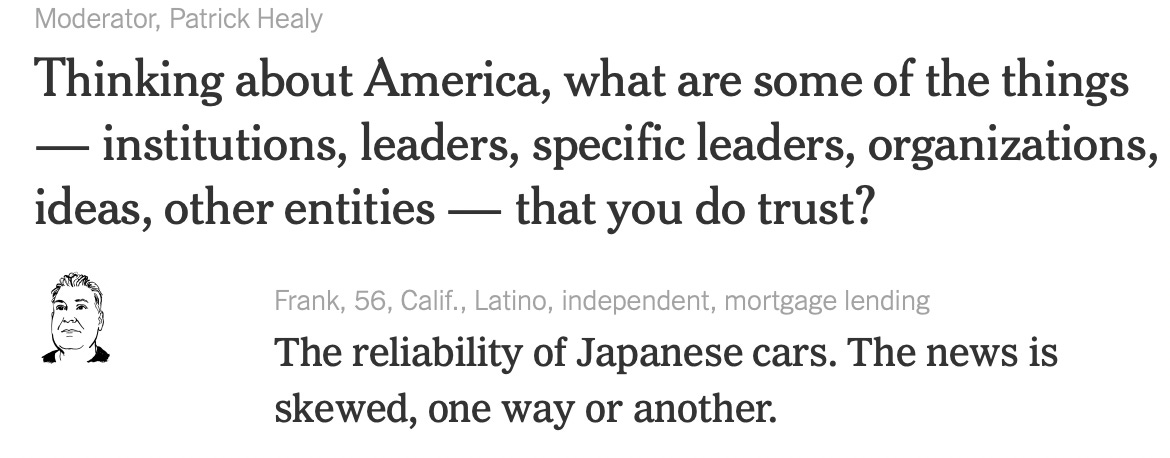TL(PM) DIGEST: Hitting pause on interest rate hikes— at least for now
Plus Japanese cars remain the one thing Americans still believe in, Biden's team averts a West Coast port strike, and declining global fertility rates

1. Fed pauses interest rate hikes, but the EU keeps on going
What happened? The Federal Reserve refrained from raising interest rates yesterday, but Federal Reserve Chair Jerome Powell strongly hinted that America’s central bank would resume rate hikes in July. Meanwhile, the European Central Bank raised the eurozone’s interest rates and signaled more hikes to come.
Why does it matter? Better-than-expected economic data in the United States—strong job growth and slowing inflation—likely influenced the Fed’s decision to pause interest rate increases, with Powell saying “the conditions we need to see in place to get inflation down are coming into place.” Europe faces higher inflation than the United States (6.1 percent versus four percent annual rates in May 2023), leading the ECB to keep raising interest rates even as disinflation continues in the eurozone as well.
TLP’s take: America and Europe are still emerging from the disruptions of the COVID-19 pandemic, with Europe facing the added hurdles of the economic disruptions caused by Russia’s war against Ukraine. Given the economic data at hand, it makes sense for the Fed to temporarily pause its own rate hikes—and for the ECB to keep going even as the eurozone slid into recession.
2. Only thing you can trust these days: “the reliability of Japanese cars”
What happened? The New York Times convened a focus group of independent, Democratic, and Republican voters to discuss issues of interpersonal trust and trust in major institutions in America.
Why does it matter? Although focus groups don’t qualify as objective measures of public opinion, they do provide interesting insights into how Americans think about matters. On issues of trust, it’s clear to these participants that something undefined has gone wrong in our society in recent years, with people mentioning rising crime and mass shootings, excessive phone and social media use, extremist politics, and the inability of those in power to come together to do things for the good of the country.
TLP’s take: It’s important to listen to voters’ concerns about their country. This focus group and the reams of public data show declining interpersonal trust and trust in government, the media, Congress, and other leading institutions, and there’s no easy or obvious fix at hand. Individuals themselves can start by doing a better job of being honest and trustworthy themselves—and our government and political leaders ought to do the same.
3. Biden administration brokers a deal to avert a West Coast port strike
What happened? A deal between longshoremen and West Coast port operates brokered by acting Labor Secretary Julie Su appears to have averted the threat of a port strike that could have snarled supply chains and cost the U.S. economy $1 billion a day. “The tentative, six-year contract agreement reached on Wednesday covers 22,000 workers and 29 west coast ports,” the Financial Times reports.
Why does it matter? A strike at America’s West Coast ports would have undermined efforts by the Biden administration and Federal Reserve to fight inflation and untangle supply chains still affected by pandemic-era disruptions. Resolving this labor dispute removes one more potential hurdle to America’s ongoing economic recovery.
TLP’s take: Kudos to the Biden administration for brokering this deal and averting a potentially costly strike. It’s hard to take credit for preventing bad outcomes, but the administration deserves it here.
4. A looming global population bust?
What happened? The Economist reports on global birth rate data finding that the “world’s largest 15 economies all have fertility rates below the replacement rate.”
Why does it matter? By 2021, according to United Nations data, 124 countries around the world had fertility rates below replacement—2.1 births per woman—up from 98 in 2010. With national populations aging rapidly across much of the world, the availability of younger workers to replace older ones who are now living longer in many places will place huge burdens on national budgets and retirement and health care programs.
TLP’s take: Governments cannot and should not force their citizens to have more children. But they can do things to make having a family less of a luxury or burden and more of a joy and important responsibility with direct family support and affordable child care options, subsidized higher education, the building of more affordable housing and transportation, crime reduction, and increased quality of life in more places.
Just one more thing…
Data from NASA’s Cassini probe indicates that the oceans of Saturn’s moon Enceladus appear to contain phosphorus—a key chemical building block for life as we know it. A proposed “orbilander” mission to Enceladus ranked third in NASA’s most recent planetary exploration priorities survey, after a Uranus orbiter and a Mars sample return mission.






